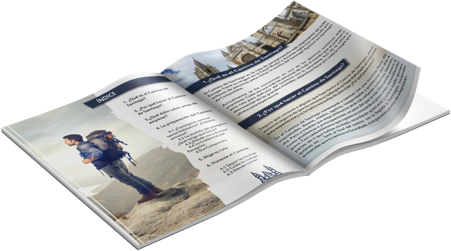Muscle fatigue is a feeling of tiredness or exhaustion that can affect anyone, especially when walking the Camino de Santiago. Muscle fatigue can significantly decrease physical performance, cause pain, and, in severe cases, lead to injuries. Fortunately, there are effective ways to prevent it, thus ensuring a more enjoyable and safer experience while walking the Camino de Santiago. How to prevent muscle fatigue? How to ensure a safe experience for your health on your pilgrimage adventure? Let’s go with our physio-tips!
Symptoms of Muscle Fatigue
Muscle fatigue, briefly, is the tiredness of the muscles, occurring when more effort than usual is exerted. This leads to extreme exhaustion of the muscle fibers, which carries a risk of injury.
Muscle fatigue usually arises from overexertion or from not having enough calcium, dehydration, overtraining, poor eating habits, etc. It manifests mainly when the levels of calcium that our fibers need to contract and relax are reduced; thus, the famous muscle cramps appear. It may also be due to an accumulation of lactic acid or a deficiency of glycogen.

A pilgrim with muscle pain
In general, symptoms can manifest in various ways:
- joint pain;
- onset of muscle cramps;
- fatigue;
- increased heart rate;
- general weakness;
- lack of strength and coordination;
- muscle stiffness;
- alteration of blood pressure.
Tricks to Avoid the Onset of Muscle Fatigue Symptoms
We assume that you previously engage in training to walk the Camino de Santiago, whether you do it on foot or do the Camino by bike. This way, your body will be accustomed to the effort. However, muscle fatigue does not forgive and could pay you a visit during your pilgrimage. Train beforehand, only then will you know you are prepared to walk the Camino de Santiago.
Muscle Strengthening
Including strength exercises in your routine not only improves physical performance but also prevents muscle fatigue. Strength training increases muscle endurance, which is especially beneficial for those planning to take a Jacobean route.

Pilgrims training in the forest for their next Camino
Avoid Physical Overexertion and Overweight Backpacks
Establish a division of stages according to your abilities, and do not set stages that are too long for you. Also, if you need to rest during the stage, stop and do it, physical overexertion is the leading cause of injuries and muscle fatigue. Also, avoid excessive weight in your backpack: many pilgrims think of “just in case” and make this very common mistake.
Warm-up, Stretching, and Cooling Down
Incorporating warm-up habits before starting physical activity, stretching during, and cooling down at the end can significantly reduce the risk of muscle fatigue. With these exercises, you prepare the body for physical exertion and facilitate muscle recovery post-exercise.
Stretching also improves flexibility and helps prevent muscle fatigue. Stretching before, during, and after walking reduces muscle tension and increases blood flow to the muscles, contributing to recovery.
It is well demonstrated that muscles that have been previously warmed up can:
- exercise for longer;
- experience less pain;
- have a lower risk of injuries.

Performing stretches is key before, during, and after the Camino
We strongly recommend wearing knee and ankle braces, as well as leg warmers. The heat they provide to your muscles makes walking more manageable.
Maintain Proper Hydration
Hydration is crucial to prevent muscle fatigue, as water helps transport nutrients to muscle cells and eliminates toxins from the body. Drinking enough water before, during, and after physical activity is essential on the Camino de Santiago, where prolonged effort is constant.
Balanced and Nutrient-Rich Diet
Just like hydration, a balanced diet rich in carbohydrates, proteins, healthy fats, vitamins, and minerals is essential to prevent muscle fatigue. Foods such as fruits, vegetables, whole grains, and lean proteins provide the energy and nutrients necessary for optimal muscle recovery.
Cold and Hot Shower, and Muscle Cream
Once the exercise, and in our case pilgrimage, stage is completed, a shower combining cold and hot water is a boon for the muscles. If, in addition, you apply a muscle recovery cream, your muscles will thank you.

Muscle creams and massages help prevent muscle fatigue
Adequate Rest and Recovery
Rest is as important as the training itself. Sleeping enough hours allows the muscles to recover and regenerate. Additionally, implementing rest days in your training helps prevent overtraining and reduces the risk of muscle fatigue.
Stress Management
Stress not only affects mentally but can also lead to muscle fatigue. Practices such as meditation, yoga, or simply spending time in nature can help reduce stress levels. Believe it or not, this will improve muscle endurance and recovery capacity.
How to Recover from Muscle Fatigue?
How to recover the muscle fatigue in the legs can be summarized in three words: rest, rest, and rest. If you find yourself in the middle of the Camino, our recommendation is to give yourself at least one or two days of rest. Elevate your legs and apply creams or sprays that help alleviate muscle fatigue. In addition to resting, you can do the following:
- use a hot thermal pack;
- take a hot bath;
- receive massages;
- warm up and stretch the body.
As always, if the situation is more serious, seek the nearest health center.

Allow yourself to rest on the Camino to prevent muscle fatigue
Preventing muscle fatigue is very important to fully enjoy the Camino de Santiago, minimizing the risk of injuries and enhancing the overall experience. Taking care of your health on the Camino is very important. Implementing these tips in your preparation will help you keep your muscles in optimal condition and your mind focused on the journey ahead.




Leave A Comment